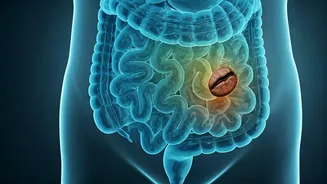Caffeine's Impact
Caffeine, a common stimulant found in coffee and tea, is often used to promote bowel movements. While it may seem like a harmless habit, relying on caffeine
in this way can create dependence and disrupt the natural rhythms of your digestive system. It essentially trains your body to expect caffeine to initiate bowel function, potentially leading to issues. Over time, your body may become reliant on caffeine to trigger this process. This can eventually lead to a less responsive gut, making it difficult for the body to function normally without it. This dependency can create a cycle where you require caffeine to relieve constipation or maintain a regular bowel routine. It's crucial to understand how caffeine interacts with your digestive system to make healthier choices for your gut health.
Gut Health Risks
The consistent use of caffeine for bowel movements can have detrimental effects on your gut health. Your gut microbiome, which is the community of bacteria residing in your digestive tract, plays an important role in overall health. Regular caffeine consumption can lead to imbalances, negatively influencing the beneficial bacteria that support digestion and nutrient absorption. As the gut’s natural functions are disrupted, the body may experience various symptoms like bloating, abdominal pain, and alterations in bowel habits. Additionally, caffeine’s stimulating properties may affect the production of digestive enzymes and the ability of your gut to process food effectively. This can exacerbate symptoms of irritable bowel syndrome or other gastrointestinal issues. By understanding these risks, individuals can prioritize a more balanced and gut-friendly approach to their well-being.
Alternatives to Caffeine
If you're looking to transition away from caffeine-induced bowel movements, several natural and healthy alternatives exist. Prioritizing a diet rich in fiber is one of the most effective strategies. Fiber, found in fruits, vegetables, and whole grains, adds bulk to stools, helping move them through the digestive tract smoothly. Staying well-hydrated is also crucial, as water softens stools and aids the digestive process. Regular exercise can stimulate bowel function by increasing blood flow to the digestive organs, making movements easier. In addition to these lifestyle changes, consider incorporating natural remedies such as consuming a teaspoon of psyllium husk in water or exploring herbal teas like senna or cascara sagrada, but these should be used cautiously. If problems persist, consult with a healthcare professional to identify and address any underlying conditions contributing to irregular bowel movements.



















